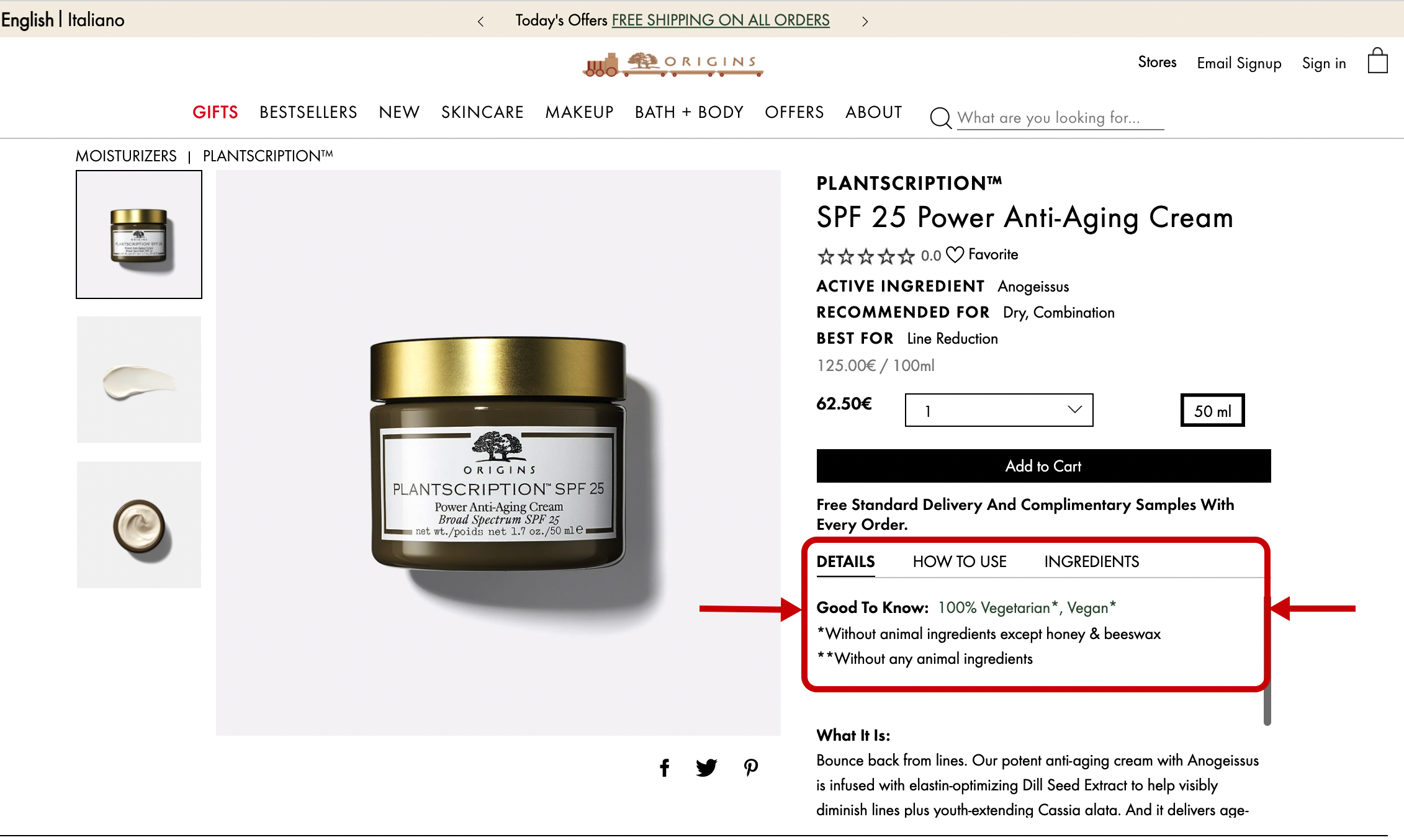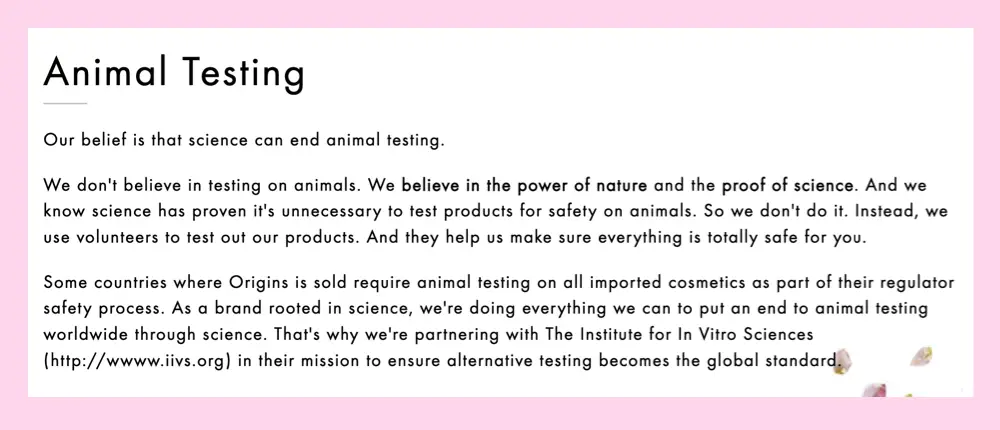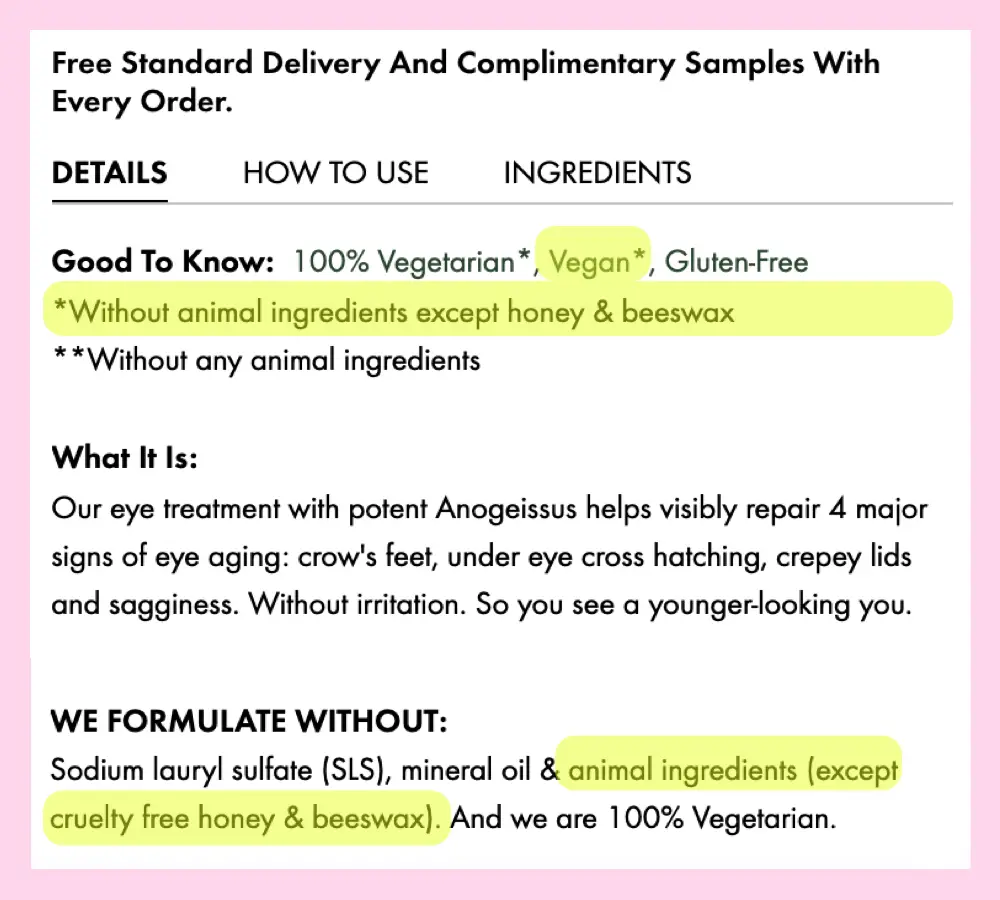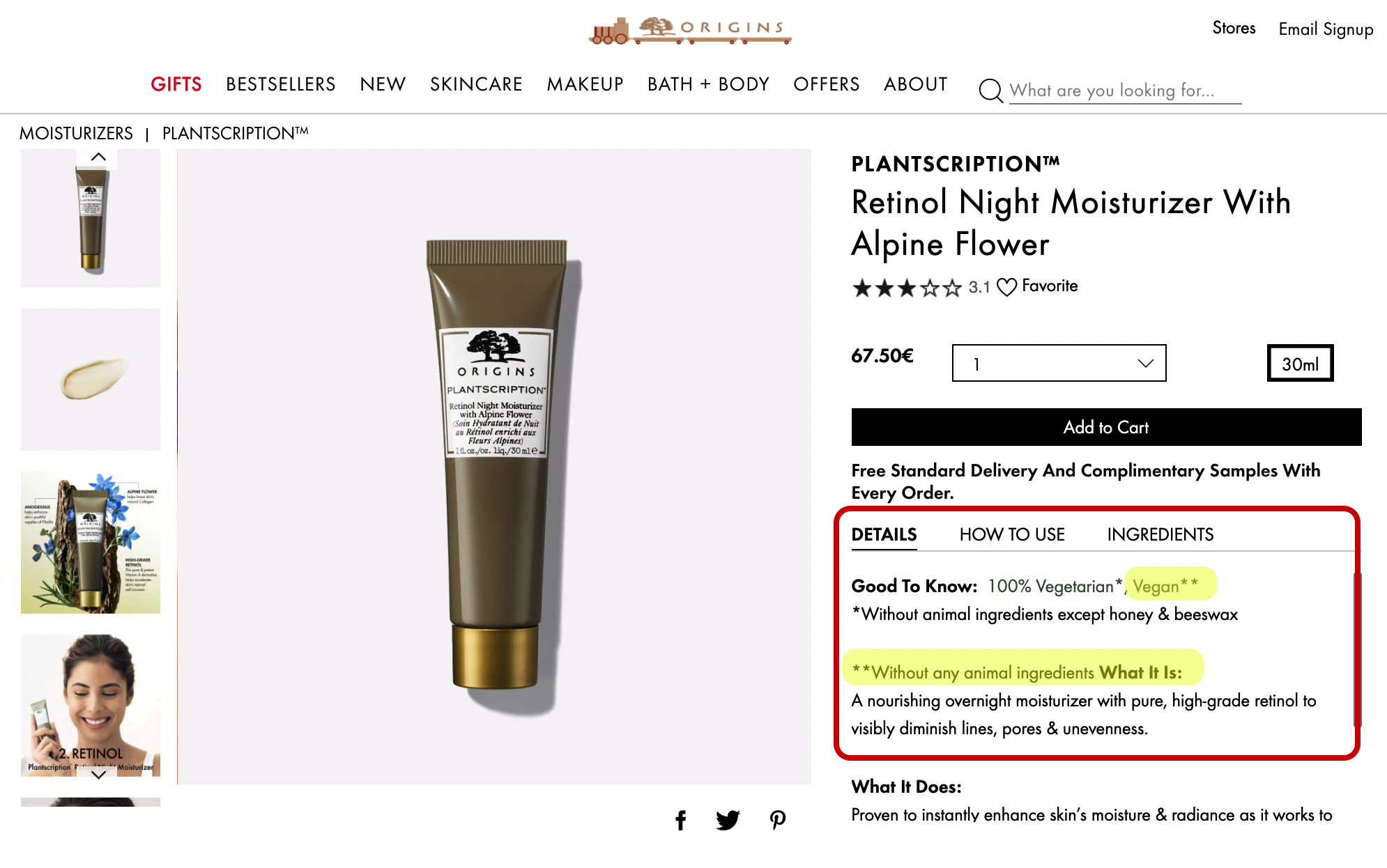Origins is all about natural skincare that uses bioactive ingredients that are "powered by nature and proven by science." But for such a "nature-loving" brand – you might be shocked at its cruelty-free and vegan policies.
Origins is not cruelty-free. It conducts animal testing on its products and distributes its cosmetics where animal testing is required by law. While Origins has products free of animal-derived ingredients, it is not considered a vegan brand.
Origins was founded by Leonard Lauder, the billionaire son of Estée Lauder, in 1990. The brand opened its first store in MA, USA and soon became an international sensation. With the idea of creating "nature-inspired" products – but the bottom line is that they're not cruelty-free.
Before deciding on what to buy, here's what you need to know about Origins' current animal testing policies, vegan ranges, formulation, and sustainability.
Is Origins Cruelty-Free and Vegan?
Origins is Not Cruelty-Free
It does:
It's uncertain whether Origins also purchases ingredients tested on animals within its supply chain, but it is possible.
Origins is also owned by Estée Lauder – which is definitely not a cruelty-free company either.
This brings us to the next point:
Origins is Not Vegan
Although Origins claims to have vegetarian and vegan ranges, it's hard to consider any of its products that are free of animal-derived ingredients as "vegan" because it's not 100% cruelty-free.
Does it have products that are free of animal-derived ingredients? Yes.
Are these products considered holistically vegan? Not in our opinion.
When Origins does use animal-derived ingredients, it's usually quite limited. It claims to only use:
Origins also claims that many of its products are completely vegetarian or vegan with an asterisk next to it that says this is with the exception of honey or beeswax.
But simply put – if a product uses beeswax or honey, it is not vegan.
If you're interested in which brands are similar to Origins but are cruelty-free and vegan – keep reading or click on this link: Vegan Alternatives to Origins.
Animal Testing Policy and History
Origins has been clear that it conducts animal testing when required by law and that it does ship to countries like China. However, they still have a stance on cruelty-free cosmetics.
Cruelty-Free Status in 2021
Here is a screenshot of Origin's official statement regarding its perspective on cruelty-free policies and vegan products, taken from their website:
Here's what we can take away from this slightly unclear and confusing statement:
Certification
Origins has no cruelty-free certification. As much as it would be nice to see cruelty-free certification – it cannot happen as long as the brand continues with its current animal-testing policies.
No cruelty-free organization would promote a product that does not adhere to the following strict criteria:
If you want to support a brand that doesn't conduct animal testing – ensure that they have the cruelty-free symbol at the back of their products, usually marked by a rabbit.
Besides PETA, you can trust organizations like Leaping Bunny or Choose Cruelty-Free, which both have tough (but excellent) criteria.
Is Origins Sold Where Animal Testing is Required By Law?
Yes, Origins distributes its products in China, where animal testing on cosmetics is required as products arrive at the border.
China has a shocking track record. It is the country with the most amount of animal testing globally, with over 20 million animals used per year.
However, if you live in China or are concerned about its cruel beauty policies, there are a couple of loopholes to be aware of. Here's how to find cruelty-free cosmetics in China: Are Cosmetics Made in China Cruelty-Free?
What Origins Products Are Vegan?
We don't consider Origin's vegan ranges holistically vegan because the brand is not 100% cruelty-free anymore.
It does have some products that are free of animal-derived ingredients. But the biggest issue is that most of its products are formulated with beeswax and honey.
Please be careful when you read its product labels. Often it says a product is vegan but includes a sub-clause saying that this doesn't include beeswax or honey.
To help you out, here are the products we could find that are free of all animal-derived ingredients, according to the Origins European site.
How we confirmed via the Origins Website that these products are vegan:
Vegan Alternatives to Origins
If you are vegan or are a strong advocate of cruelty-free cosmetics – Origins is not the right brand for you.
Luckily, there are many alternatives you can find that are certified cruelty-free and vegan to choose from.
Here are some nature-inspired skincare brands within the same price range that are 100% vegan and cruelty-free.
Is Origins Natural and Organic?
It's unclear whether Origins is organic, as it does not stipulate much to the public. The term "organic" is regulated by the USDA and means an ingredient is free of synthetic pesticides, fertilizers, or non-organic substances.
However, Origins does have relatively natural formulas.
What are natural cosmetics?
The term "clean" or "natural" is not regulated for cosmetics and skincare. In other words, it doesn't hold one specific meaning.
In Origins case, it means a product is free of certain more toxic synthetic ingredients, including parabens, phthalates, sulfates, and more, as well as using ingredients that are of immediate plant origin.
Here's the thing – "natural" is not necessarily a good thing. Just because an ingredient is natural (take chili peppers, for example) doesn't mean you should rub it on your skin.
All products use a certain amount of synthetic ingredients in their formulas, and Origins is no exception. For the most part, they choose to use clean synthetics.
Clean synthetic ingredients are safe and non-toxic, which actually preserve the stability of a beauty formulation.
However, some ingredients are still known allergens or irritants.
As a conscientious shopper, you must read up on any brand's ingredient list before you make a purchase – especially if you live within the United States.
This is because the FDA has only banned or restricted 11 harmful chemicals from cosmetics within the country. Europe, on the other hand, has banned 1,328!
With skincare and cosmetics, you want to avoid these ingredients:
Does Origins Use Safe Ingredients?
Origins has stepped up its game here a lot! It got a lot of backlash in the past for using harsh chemicals and ingredients with higher toxicity levels – which goes against everything the brand supposedly stands for.
Today, it's changed its formulas a lot. It has a relatively decent spread of ingredients that can benefit your skin, and it also avoids using anything that could be harmful where possible.
According to Skin Safe, Origins usually has an 82% - 91% allergen-free ranking for each product.
All of Origins products are free of allergens such as parabens, phthalates, propylene glycol, formaldehyde, sodium lauryl sulfate (SLS), mineral oil, petrolatum, paraffin, diethanolamine (DEA), and polyethylene beads.
Reading the ingredient list is crucial because Origins is not 100% free of gluten, irritants, or fragrance, which means some products may not be suitable for people with sensitive skin.
Most Origins products are free of these harmful ingredients, but that doesn't mean you shouldn't check. All ingredients are subject to change so keep your eyes open.
Are Cruelty-Free Ingredients Safe?
If you're worried about how safe it is to use cosmetics that are not tested on animals – please relax and take a sigh of relief.
There is no reason why cruelty-free products shouldn't be just as safe, if not safer, than anything tested on an animal.
Not only is it easy to test ingredients without using animals altogether, but there are so many pre-approved ingredients you can use to make cosmetics that there really is no need.
Here's more on the subject if you're interested: Are Cruelty-Free Cosmetics Safe?
Is Origins Sustainable and Ethical?
Once again, Origin is trying to step up here and live up to its "au natural" image.
It's no secret that the world has a huge waste problem, and cosmetic brands are only making it worse by using unsustainable packaging and harmful ingredients.
Origins has an entire page dedicated to its sustainability mission on its website. As it stands, the brand has:
Final Thoughts
All in all, Origins is a well-developed cosmetics brand that considers various ethical factors. We appreciate that it has a certain amount of transparent supply chain and is open to the public about its policies eco-efforts too.
However, the fact that it is not cruelty-free means it takes a step in the wrong direction. As much as Origins claims to be actively against animal testing, they choose to distribute to China, which is a direct conflict of interest.
For this reason, we cannot consider its products that are free of animal-derived ingredients as holistically vegan either.
We hope to see a change in this issue, but it is unlikely right now. It is up to us as consumers to stand for what we will and won't accept from our cosmetics. This is something we cannot accept.




